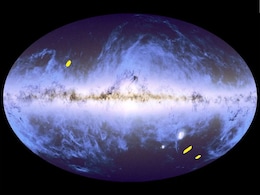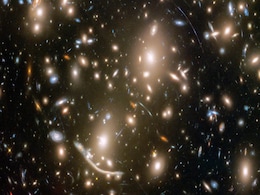Dark Matter Candidate
- All
- News
- Videos
-

ESA’s Euclid Telescope Releases First Data, Mapping 26 Million Galaxies
- Wednesday March 26, 2025
- Written by Gadgets 360 Staff
ESA’s Euclid telescope has released its first dataset, mapping 26 million galaxies within a week. The observations include deep-field images, a survey of 380,000 galaxies, and 500 new gravitational lens candidates. Scientists will continue tracking cosmic evolution over six years. The dataset, currently 35 terabytes, is expected to grow to 2 peta...
-
 www.gadgets360.com
www.gadgets360.com
-

New Dark Matter Hypothesis Suggests Ionisation Clue in Milky Way’s Core
- Wednesday March 12, 2025
- Written by Gadgets 360 Staff
Researchers propose that an overlooked dark matter candidate may explain unusual ionisation levels in the Milky Way’s Central Molecular Zone (CMZ). This theory suggests that lightweight, self-annihilating dark matter particles could be producing electrons and positrons, influencing cosmic chemistry. The findings challenge conventional views, offe...
-
 www.gadgets360.com
www.gadgets360.com
-

Dark Matter Mass Limits Linked to Higgs Boson Interactions
- Wednesday January 29, 2025
- Written by Gadgets 360 Staff
Efforts to unravel dark matter's mysteries have revealed a potential mass limitation due to its interaction with the Higgs boson. A new study suggests that dark matter particles exceeding a few thousand giga-electron volts (GeV) could disrupt the Higgs boson, altering fundamental physical laws. This finding challenges the Standard Model and prompts...
-
 www.gadgets360.com
www.gadgets360.com
-

James Webb Telescope Breaks Record with Discovery of Early Galaxies Dating 200 Million Years After Big Bang
- Wednesday December 4, 2024
- Written by Gadgets 360 Staff
The James Webb Space Telescope has spotted five galaxy candidates dating back to 200 million years after the Big Bang. These findings could transform our understanding of early cosmic evolution. Discovered via gravitational lensing, these galaxies, if confirmed, predate known formations and offer vital insights into the universe’s infancy. Scient...
-
 www.gadgets360.com
www.gadgets360.com
-

Study Claims Tiny Black Holes Could Be Altering Earths Orbit
- Friday January 26, 2024
- Science | Edited by Nikhil Pandey
Tiny black holes from the early universe could potentially change Earth's orbit, leading to the wobbling of planets and moons in our vicinity.
-
 www.ndtv.com
www.ndtv.com
-

ESA’s Euclid Telescope Releases First Data, Mapping 26 Million Galaxies
- Wednesday March 26, 2025
- Written by Gadgets 360 Staff
ESA’s Euclid telescope has released its first dataset, mapping 26 million galaxies within a week. The observations include deep-field images, a survey of 380,000 galaxies, and 500 new gravitational lens candidates. Scientists will continue tracking cosmic evolution over six years. The dataset, currently 35 terabytes, is expected to grow to 2 peta...
-
 www.gadgets360.com
www.gadgets360.com
-

New Dark Matter Hypothesis Suggests Ionisation Clue in Milky Way’s Core
- Wednesday March 12, 2025
- Written by Gadgets 360 Staff
Researchers propose that an overlooked dark matter candidate may explain unusual ionisation levels in the Milky Way’s Central Molecular Zone (CMZ). This theory suggests that lightweight, self-annihilating dark matter particles could be producing electrons and positrons, influencing cosmic chemistry. The findings challenge conventional views, offe...
-
 www.gadgets360.com
www.gadgets360.com
-

Dark Matter Mass Limits Linked to Higgs Boson Interactions
- Wednesday January 29, 2025
- Written by Gadgets 360 Staff
Efforts to unravel dark matter's mysteries have revealed a potential mass limitation due to its interaction with the Higgs boson. A new study suggests that dark matter particles exceeding a few thousand giga-electron volts (GeV) could disrupt the Higgs boson, altering fundamental physical laws. This finding challenges the Standard Model and prompts...
-
 www.gadgets360.com
www.gadgets360.com
-

James Webb Telescope Breaks Record with Discovery of Early Galaxies Dating 200 Million Years After Big Bang
- Wednesday December 4, 2024
- Written by Gadgets 360 Staff
The James Webb Space Telescope has spotted five galaxy candidates dating back to 200 million years after the Big Bang. These findings could transform our understanding of early cosmic evolution. Discovered via gravitational lensing, these galaxies, if confirmed, predate known formations and offer vital insights into the universe’s infancy. Scient...
-
 www.gadgets360.com
www.gadgets360.com
-

Study Claims Tiny Black Holes Could Be Altering Earths Orbit
- Friday January 26, 2024
- Science | Edited by Nikhil Pandey
Tiny black holes from the early universe could potentially change Earth's orbit, leading to the wobbling of planets and moons in our vicinity.
-
 www.ndtv.com
www.ndtv.com







